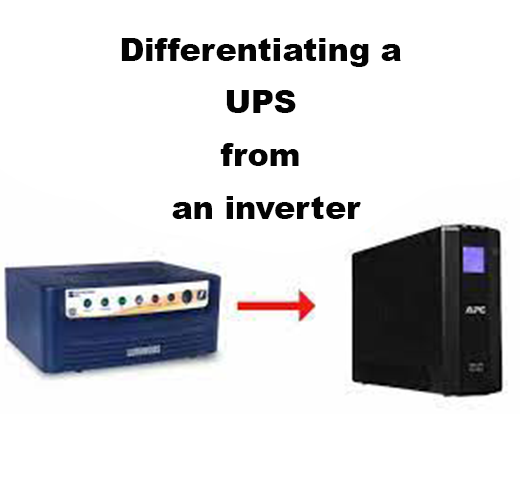Introduction
Nowadays, electricity is a must-have in our lives. Most of our day-to-day activities need it, whether it's using our laptops, washing machines, electric cookers, cell phones, or coolers. A power outage can cause chaos and disruption, so electrical power systems such as UPS and Inverters have been invented to provide uninterrupted access. People often get confused distinguishing between the two and wonder what sets them apart. This article will help you understand their differences so you can make the best of them. Before looking at the differences let's get a better understanding of how they work.
UPS
UPS stands for Uninterrupted Power Supply - as suggested by its name, it prevents system interruption during power blackouts. This is primarily used with computers to supply enough electricity to save data and shut down safely. It includes a rectifier that converts AC to DC and charges a battery, as well as an inverter that changes the DC back to AC and a controller that manages the system. UPS provides power for up to around 10-15 minutes only, so it is mainly employed with IT systems or electronic devices that can be damaged by sudden power losses.
Inverter
Inverters are power electronic devices whose main purpose is to convert DC to AC. To do this, AC mains power is first rectified into DC, which charges a battery. This DC is then converted back into AC by the inverter for industrial and household systems that run on AC power. When the electricity goes out, Inverters use the stored power from the battery to supply electricity to equipment within the home. No external power supply is needed for the Inverter's operation.
Key Differences Between UPS and Inverter
1) Use Case & Backup Time
If you rarely experience power outages, a UPS can protect your computer from hardware failure. The switch is instantaneous so there's no need to shut down your computer. Generally, a UPS offers up to 30 minutes of backup power. In comparison, an inverter takes more time to switch than a UPS; it usually causes PCs to reboot due to the disruption of the supply. Therefore, PCs are better suited for UPS, while an inverter is ideal for homes as the delay in switching doesn't affect lightbulbs.
UPS can provide backup for your devices for around 15 minutes, whereas an Inverter can provide backup for hours depending on its capacity. The inverter allows you to power the complete house depending on the capacity. So if your area has a more extended power cut, you can use it at least keep a couple of lights and fan running.
2) Maintenance & Lifespan
UPS require no maintenance. Inverters, however, are more complex to install and require distilled water to be replenished regularly. I've noticed that more modern versions of inverters can eliminate the need for this upkeep. The downside of UPS is due to the constant charging and discharging cycles, their batteries will degrade at a quicker rate than those of inverters-around four to five times faster.
3) Price
UPS and inverters are designed with the same aim - to provide an alternative power source. However, there are some differences to consider when buying either one. UPS are more expensive than inverters, but this is because they come with built-in rectifiers and batteries, while inverters require external batteries. UPS can be used in homes, offices and industries, while inverters are only used in the office. They also differ in terms of power sources - UPS require complex wiring, while generators and inverters can be less costly. Moreover, the UPS switches on quickly compared to an inverter which experiences a time delay when it detects a power interruption. This makes the UPS suitable for sensitive systems such as computers that cannot bear a sudden power loss. Factors such as backup time, capacity, charging time and warranties must also be taken into consideration when deciding which one to buy.
The main function of the UPS is to store the electric supply whereas the inverter converts the AC power into DC power.
During the power outages, the UPS immediately switch over from the main supply to the battery whereas the inverter has a time delay.
The UPS provides the electrical backup power, and the inverter provides the electronics backup power supply.
The Offline, Online and Line Interruptive are the types of the UPS whereas the inverter is of two types, i.e., the standby inverter and Grid tie inverter.
The UPS is directly connected to the home appliances whereas the inverter is first linked to the battery and then attached to the appliances circuit.
The UPS is more expensive as compared to the inverter.
The rectifier and battery are inbuilt in the circuit of UPS. The rectifier converts the AC into DC and stores the energy into battery whereas the inverter has an external battery for storing the DC power.
The UPS provides the backup supply for very short duration whereas the inverter supplies the power for an extended period.
The UPS does not have voltage fluctuation because their input is independent of the output supply whereas the inverter has voltage variation.
The UPS is used for the domestic purpose, in offices and industries whereas the inverter is used in the office.
Though designed with the same aim to substitute electricity, inverters, and UPS differ in their working principle, type of application and power sources. UPS have complex wiring and are expensive. Whereas generators and inverters are less expensive.
UPS contains built-in batteries whereas for inverters batteries are external. While UPS is directly plugged into appliances, inverters are connected to the main power line of the household to send power to appliances. Though the working of inverter and UPS are similar the main difference is time taken by them to switch ON.
After detecting an interruption in power UPS is switched ON immediately whereas inverter uses some delay to switch ON. Thus UPS is used for sensitive systems such as a computer which cannot afford the sudden power loss.
Conclusion
In our daily lives, we are heavily dependent upon appliances that run on electricity such as fans, lights, Laptops, AC, fridge, and so on. Inverters and UPS are used to support power supplies when there is power outage either from the Supply Authority or Generator House.
Typically, A UPS is a device that helps in keeping an electrical system for some minutes whenever there is power failure. It makes use of battery which helps to continue power when there is power outage.
When it comes to price, UPS are generally cheaper than Inverters. Different types of these two devices exist, and they can be found at various prices. Before purchasing one, you should consider factors such as backup time, capacity, charging time, power requirement, crating (charge quantity of a fully charged cell) and warranties. Additionally, UPS come with a rectifier that provides the system with backup power; on the other hand, inverters convert DC into AC.
If you need prolonged backup power for your home or business, or you wish to protect your sensitive equipment at all times, contact Gibadi.com today. We have the best UPS and Inverter from notable brands in stock.














